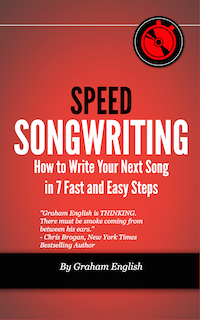
Songwriting is a fun and rewarding but often challenging pursuit. However, you can make the process faster and more productive with the right tools and tips.
1. Set a time limit for songwriting
You can complete many of the steps in the Speed Songwriting Mastery Program in under five minutes. Therefore, I recommend setting a 5-minute timer and aiming to complete your task in that time. Don’t worry, the quality of your work won’t suffer. Quality is more likely to suffer when you spend too much time trying to get it “perfect.”
Have you ever heard of Parkinson’s law? It says that work expands to fill the time available for its completion. If you give yourself an hour to write a song title, the task will take an hour. The best way to overcome Parkinson’s law is to give yourself a time limit. It may come as a struggle at first, but you’ll get faster and find your flow more immediately with practice.
2. Write lyrics first and come back to the melody later
If a melody comes to you, that’s excellent news. But if the melody isn’t coming to you immediately, start with the lyrics. Here’s why musicians should focus on lyrics first:
- Musicians likely haven’t practiced writing lyrics as music as playing an instrument and need to practice writing lyrics.
- Lyrics set the tone, define the rhythm, and even influence harmony. It’s much easier to start with a lyrical concept and write the music around that.
This idea really hit home for me when virtuoso bassist Victor Wooten demonstrated how you could play nothing but wrong notes, but if the rhythm is good, it almost sounds right. I call it The Melodic Rhythm Method, and I teach it in the Speed Songwriting Mastery Program. The idea is to prioritize the melodic rhythm before the notes. It works great!
3. Keep your instrument nearby when you write so that you can work on it as inspiration strikes
Be ready when ideas come. Have an instrument and recording device nearby. Here’s another tip: Have only a few places to capture song ideas. If you have your song ideas in five audio recorders, seven notebooks, and thirteen computer folders, then chances are all those unfinished open loops are unconsciously stressing you out. On the other hand, if you capture your song ideas in a central location, your songwriting will be better organized and easier to manage.
Here’s the minimum of what you need to capture:
- Lyrics
- Song Titles (Read How To Get More Listeners With “Lizard Brain” Song Titles)
- Written Music
- Recorded Audio
Keep your songwriting system simple. If you have song titles, melodies, and chord changes scattered over multiple inboxes, they’re going to be much harder to find and keep track of. So instead, try to capture your audio recordings on a single device, like an iPhone. Keep a single notebook for lyrics and written music. And have an organized computer filing system for all your digital writing.
4. Use a metronome to keep your timing consistent
As I said in tip #2, you could play nothing but wrong notes, but it almost sounds right if the rhythm is good. Now, I’m not saying you should write wrong notes, but the rhythm is of utmost importance. And a lot of songs-in-progress I’m asked to listen to have weak rhythms. So the remedy for weak rhythm is to practice with a metronome.
The tempo sets up the rhythm of your lyrics, so it’s important to have a consistent tempo as you write. Even if you have good internal timing, a metronome will help you stick to your original tempo, and it will support you as you try out different lyrical rhythms. Metronome apps are easy to find and use, and they’re fundamental tools to use.
5. Use software like GarageBand or Logic Pro to help you write and record your songs
Songwriting software can be extremely helpful in the songwriting process. Cutting and pasting ideas on a timeline makes songwriting much faster. And when you become fluent with an app like Logic Pro, you can even record your songs as you write them, as songwriters like Ryan Tedder like to do. You could even experiment with AI songwriting tools to help you generate fresh ideas and breakthrough creative ruts.
6. Collaborate with other songwriters to get ideas and feedback
Collaborating with other songwriters is a great way to get ideas and feedback. It’s also a great way to improve your songwriting skills. You can learn from each other and push each other to new levels. When you collaborate, you also get to share the workload, making the process more fun and less daunting.
7. Experiment with different songwriting techniques
Don’t be afraid to experiment with different songwriting techniques. You may find that one approach works better for you than another. And as you experiment, you’ll also get better at using the methods that work best for you. So don’t limit yourself to only one songwriting method. Try different approaches and see what works best for you.
One of the reasons people love Speed Songwriting is because it gives you several roadmaps to follow, even if you follow the steps sequentially. In addition, there are many techniques to write song titles, lyrics, melodies, etc., so you’ll never get stuck again. And you can discover all of those techniques when you enroll in the Speed Songwriting Mastery Program.
8. Take breaks when you need them, but try to stay focused while you’re working
When you’ve been working on a song for too long, it’s easy to become too close to it and lose objectivity. That’s why it’s essential to take breaks when you reach your saturation point and come back later with fresh ears. And that’s why it’s even more important to write your song quickly before you get to that point. Of course, you’re not aiming to write a perfect song but a quick first draft. You can always edit the song with fresh ears but finish the first draft quickly.
It’s much easier to finish the first draft when you have a songwriting system in place that helps you stay focused while you’re writing. If you don’t know what to do next, spend some time optimizing your system so you don’t get stuck again.
9. Practice, practice, practice! The more you write, the better your songs will be.
The more you write, the better your songs will be. It’s as simple as that. The more experience you have, the better you’ll become at songwriting. And the better you become at songwriting, the easier it will be to write good songs quickly. So don’t be discouraged if your first few songs aren’t keepers. Just keep writing and practicing, and eventually, you’ll write more songs that you’re proud to share.
These are just a handful of tips to help you write better songs faster. If you follow these tips, you’ll find that your songwriting will improve, and the process will become faster and more enjoyable. And don’t forget to have fun! Songwriting is supposed to be enjoyable, so make sure it is for you. Thanks for reading!
Related Resources:

Enter your first name and email address below and click “GET ACCESS NOW!” to get the Speed Songwriting Cheat Sheet delivered to your inbox!
We guarantee 100% privacy. Your information will not be shared.

Leave a Reply